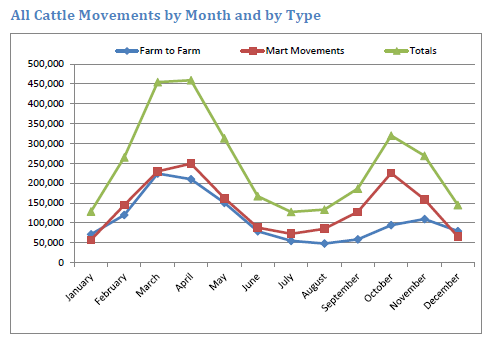A detailed submission has been sent to the Minister for Agriculture to resolve the difficulties for farmers and marts operating under the current Level 5 restrictions, according to the Irish Farmers’ Association (IFA).
Over 450,000 cattle are traded through the marts in the October to December period, the association says.
385,000 of these cattle were sold in October and November in 2019, with weanling sales the main driver of numbers, it was added.
The association highlighted the movements of cattle from the 2019 AIMS Annual Report through the below chart.
Commenting, IFA president Tim Cullinan said: “This is a critical time of year for our suckler, beef and sheep farmers in the market place and it is vital the mart sales function in a manner that is as open, transparent and competitive as possible over the next number of weeks.”
Acknowledging the efforts made by Minister for Agriculture, Food and the Marine Charlie McConalogue and the department to ensure the marts remain operational during the Level 5 restrictions, Cullinan said the option to hold cattle doesn’t exist for the majority of farmers selling at this time of year.
The president said the online bidding system has bedded down well in some marts as a supplementary system to a presence of buyers in the ring.
However, there are huge concerns about marts operating exclusively under this system, and in particular at this time of year when throughput is at peak numbers, he said.
The IFA has set out some key points in the submission to the minister in seeking the facilitation of controlled numbers of buyers at the ringside.
- Suckler, beef and sheep farmers are heavily dependent on an effective mart system at this time of year;
- The platforms being used to run sales have been working well, but what happened on Saturday when one of the online systems went down shows the risk of operating using this system alone;
- Poor-quality broadband is also a contributor to the difficulties for marts and farmer buyers with an exclusive on-line sales system;
- Not all buyers are comfortable using this system and there is a concern that they will not be active bidders. This could reduce the number of bidders and affect the integrity of the market;
- Mart rings are generally very spacious, with high roofs and numerous openings with good airflow.
Against this background, the IFA has again called for the facilitation of a strictly limited number of buyers around the ring, with full government guidelines for social distancing and the wearing of masks applied.
IFA Livestock Committee chairman Brendan Golden said: “We recognise this is a difficult time for all businesses, but given the essential nature of providing an effective market outlet for cattle and sheep at this time of year and the consequences of this not being available.
The current measures must be reviewed and a limited number of buyers must be allowed at the ringside to ensure sales proceed and the market functions in as open and transparent a means as is possible.
Farmers have played their part in the national efforts to-date in dealing with this pandemic and will continue to do so in a safe and responsible manner, the chairman concluded.

